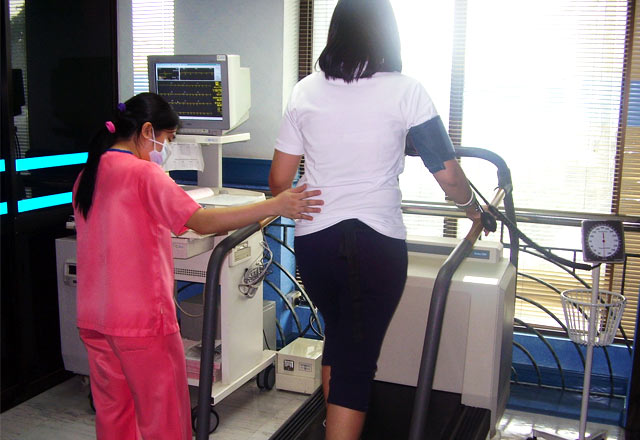
Non-Invasive Cardiovascular Laboratory
Detecting heart problems and abnormalities on inpatient or outpatient basis
Our Non-Invasive Cardiovascular Laboratory offers high-quality, painless diagnostic procedures to identify heart issues or diseases on an inpatient or outpatient basis. These tests require no needles, dyes, or x-rays, and come with no risks or side effects.
Our team includes certified cardiovascular technologists, peripheral vascular ultrasound technologists, electrocardiography technicians, and board-certified adult and pediatric cardiologists. We are staffed 24 hours a day for emergency care. Our advanced diagnostic equipment enables the team to assist physicians, cardiologists, and other specialists in obtaining high-quality test results.

Services at a Glance
We provide non-invasive tests in our cardiac and peripheral vascular lab. These services include:
CARDIO
- 12- Lead ECG
- 15- Lead ECG
- Long Lead/Rhythm Strip
- 24-Hour Holter Monitoring
- 24-Hour Ambulatory BP Monitoring
- Treadmill Exercise Test
ECHO
- 2D Echocardiogram Plain
- 2D Echocardiogram with Color Doppler Study
- Stress Echocardiogram
- Dobutamine Stress Echocardiogram
- Trans Esophageal Echocardiogram (New Service)
VASCULAR
- Carotid Duplex Scan
- Arterial and Venous Duplex Scan
- Ankle-Brachial Index
- DVT Screening
Commonly performed diagnostics include:
- Cardiac stress testing – Also known as treadmill exercise test or exercise EKG, it helps a doctor find out how well your heart handles work.
- 24-hour Holter monitoring – Used in diagnosing heart rhythm disturbances that may occur at times when you are away from the doctor, used in line with a written diary or log of your daily activities.
- Ambulatory blood pressure monitoring – A widely accepted clinical tool to collect multiple blood pressure measurements, helping clinicians diagnose and manage hypertension.
- Ankle-brachial index (ABI) – A simple, reliable test for diagnosing PAD in the legs, and whether it is restricting blood flow in your legs.
- Dobutamine stress echocardiogram – Used when a doctor seeks to assess the heart muscle under stress. If exercising on a treadmill puts too much stress on the heart, a doctor may use the intravenous medication dobutamine.
- Stress echocardiogram – Combines an ultrasound study of the heart with an exercise test, allowing the doctor to learn how the heart functions when it must work harder.
- Echocardiography – Also called “echo,” an echocardiogram is a graphic outline of the heart’s movement. During the test, ultrasound that comes from a handheld wand placed on the chest is used to produce pictures of the heart’s valves and chambers, and help the sonographer evaluate the heart’s pumping action.
- Venous duplex / doppler studies and deep vein thrombosis screening – A duplex imaging of the lower extremity venous system, detecting deep or superficial thrombosis of the extremities.
- Carotid duplex / doppler studies – Duplex imaging that produces a 2D image in grey scale of the vessel walls, showing any plaque formation and indicating any irregularities, stenoses, or occlusions.
Specialty Clinics
Ask a question
Quick Contact
- Address CMC Cardiovascular Center, 2nd Flr., CMC V Bldg., Quezon Avenue Cor. Scout Magbanua St., Quezon City, Philippines, 1103
- Email info@capitolmedical.com.ph
- Phone (+632) 8372-38-25
local 4249 / 4250 - Fax (+632) 411-43-20







